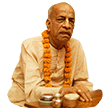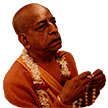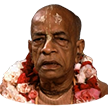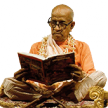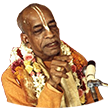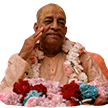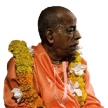Embodied Souls - an essential subject: Difference between revisions
(Created page with "Category:Essential Subjects <!----------------------- edit below this line -----------------------> <!------------------------ begin introduction text below --------------...") |
(Vanibot #0041: Moves Choose Another box to the end) |
||
| Line 2: | Line 2: | ||
<!----------------------- edit below this line -----------------------> | <!----------------------- edit below this line -----------------------> | ||
<!------------------------ begin introduction text below ------------------------> | <!------------------------ begin introduction text below ------------------------> | ||
The embodied soul lives in the city of nine gates. The activities of the body, or the figurative city of body, are conducted automatically by its particular modes of nature. The soul, although subjecting himself to the conditions of the body, can be beyond those conditions, if he so desires. Owing only to forgetfulness of his superior nature, he identifies with the material body, and therefore suffers. By Kṛṣṇa consciousness, he can revive his real position and thus come out of his embodiment. | |||
Srila Prabhupada's books, lectures, conversations and letters offer a comprehensive presentation of this essential subject as seen in the Vaniquotes '''[[Vaniquotes:Category:Embodied Souls|Embodied Souls]]''' category. An introduction from his books is given below in the following | Srila Prabhupada's books, lectures, conversations and letters offer a comprehensive presentation of this essential subject as seen in the Vaniquotes '''[[Vaniquotes:Category:Embodied Souls|Embodied Souls]]''' category. An introduction from his books is given below in the following 8 quotes. | ||
<!-------- end introduction text and don't touch next three lines ---------> | <!-------- end introduction text and don't touch next three lines ---------> | ||
---- | ---- | ||
== Quotes from Srila Prabhupada's books == | == Quotes from Srila Prabhupada's books == | ||
<!----------------- edit quote boxes below this line -----------------> | <!----------------- edit quote boxes below this line -----------------> | ||
{{VaniQuotebox| | {{VaniQuotebox|Any action or reaction of a part of a body becomes a cognizable fact to the embodied soul|As stated before, Vyāsadeva is a liberated soul, and he compiled this book of authority after attaining spiritual perfection. Since the complete whole, or the Absolute Truth, is the source of everything, nothing is independent of Him. In one sense, everything that exists is the body of the Absolute Truth. Any action or reaction of a part of a body becomes a cognizable fact to the embodied soul. Similarly, since the creation is the body of the Absolute Truth, then everything in the creation is known to the Absolute, both directly and indirectly. '''(Teachings of Lord Caitanya, Chapter 23)'''}} | ||
{{VaniQuotebox| | {{VaniQuotebox|Any action or reaction of a part of a body becomes a cognizable fact to the embodied soul. Similarly, since the creation is the body of the Absolute Truth, then everything in the creation is known to the Absolute, both directly and indirectly| Since the complete whole, or the Absolute Truth, is the source of everything, nothing is independent of Him. In one sense, everything that exists is the body of the Absolute Truth. Any action or reaction of a part of a body becomes a cognizable fact to the embodied soul. Similarly, since the creation is the body of the Absolute Truth, then everything in the creation is known to the Absolute, both directly and indirectly. '''(Teachings of Lord Caitanya, Chapter 23)'''}} | ||
{{VaniQuotebox| | {{VaniQuotebox|As the embodied soul continuously passes, in this body, from boyhood to youth to old age, the soul similarly passes into another body at death|As the embodied soul continuously passes, in this body, from boyhood to youth to old age, the soul similarly passes into another body at death. The self-realized soul is not bewildered by such a change." Such verses from the Bhagavad-gītā or any other Vedic literature give valuable instructions on the occasion of someone's passing away. By discussing such instructions from the Bhagavad-gītā or Śrīmad-Bhāgavatam, a sober man can certainly understand that the soul never dies but rather passes from one body to another. '''(Caitanya-caritāmṛta, Ādi-līlā 16.23)'''}} | ||
{{VaniQuotebox| | {{VaniQuotebox|Being in a bewildered condition, therefore, the embodied soul identifies himself with the circumstantial material body and becomes subjected to the temporary misery and happiness of life|Being in a bewildered condition, therefore, the embodied soul identifies himself with the circumstantial material body and becomes subjected to the temporary misery and happiness of life. The Lord is the constant companion of the living entity as Paramātmā, or the Supersoul, and therefore He can understand the desires of the individual soul, as one can smell the flavor of a flower by being near it. Desire is a subtle form of conditioning for the living entity. The Lord fulfills his desire as he deserves: Man proposes and God disposes. '''(Bhagavad-gītā 5.15)'''}} | ||
{{VaniQuotebox| | {{VaniQuotebox|O Providence, you have no mercy! You bring embodied souls together through friendship and affection, but before their desires are fulfilled, you separate them. Your activities are like the foolish pranks of children|O Providence, you have no mercy! You bring embodied souls together through friendship and affection, but before their desires are fulfilled, you separate them. Your activities are like the foolish pranks of children. '''(Caitanya-caritāmṛta, Antya-līlā 19.45)'''}} | ||
{{VaniQuotebox| | {{VaniQuotebox|Prahlada Maharaja prayed: My Lord Nrsimha-deva, O Supreme, because of a bodily conception of life, embodied souls neglected and not cared for by You cannot do anything for their betterment|My Lord Nṛsiṁha-deva, O Supreme, because of a bodily conception of life, embodied souls neglected and not cared for by You cannot do anything for their betterment. Whatever remedies they accept, although perhaps temporarily beneficial, are certainly impermanent. For example, a father and mother cannot protect their child, a physician and medicine cannot relieve a suffering patient, and a boat on the ocean cannot protect a drowning man. '''(Śrīmad-Bhāgavatam 7.9.19)'''}} | ||
{{VaniQuotebox| | {{VaniQuotebox|The embodied soul, by his immemorial desire to avoid Krsna consciousness, causes his own bewilderment|The embodied soul, by his immemorial desire to avoid Kṛṣṇa consciousness, causes his own bewilderment. Consequently, although he is constitutionally eternal, blissful and cognizant, due to the littleness of his existence he forgets his constitutional position of service to the Lord and is thus entrapped by nescience. And, under the spell of ignorance, the living entity claims that the Lord is responsible for his conditional existence. '''(Bhagavad-gītā 5.15)'''}} | ||
{{VaniQuotebox| | {{VaniQuotebox|The human form of life is called arthada because the body can very nicely help the embodied soul to achieve the highest perfection|The human form of life is called arthada because the body can very nicely help the embodied soul to achieve the highest perfection. Prahlāda Mahārāja said that even though temporary, the body can give us the highest perfectional achievement. In the process of evolution from the lower to the higher grade of living, the human form of life is a great boon. But māyā is so strong that in spite of achieving this great boon of the human form of life, we are influenced by temporary material happiness, and we forget our goal of life. '''(Śrīmad-Bhāgavatam 7.4.44)'''}} | ||
<!----------------- edit quote boxes above this line -----------------> | <!----------------- edit quote boxes above this line -----------------> | ||
| Line 31: | Line 31: | ||
'''Embodied Souls- [[Vaniquotes:Category:Embodied Souls|explore more within this category]]'''. | '''Embodied Souls- [[Vaniquotes:Category:Embodied Souls|explore more within this category]]'''. | ||
{{EsentialSubjectTotal}} | {{EsentialSubjectTotal}} | ||
<div style="float:left;"> | |||
{{EssentialSubjectnav}} | |||
</div> | |||
__NOTOC__ | __NOTOC__ | ||
__NOEDITSECTION__ | __NOEDITSECTION__ | ||
Latest revision as of 16:16, 22 November 2020
The embodied soul lives in the city of nine gates. The activities of the body, or the figurative city of body, are conducted automatically by its particular modes of nature. The soul, although subjecting himself to the conditions of the body, can be beyond those conditions, if he so desires. Owing only to forgetfulness of his superior nature, he identifies with the material body, and therefore suffers. By Kṛṣṇa consciousness, he can revive his real position and thus come out of his embodiment.
Srila Prabhupada's books, lectures, conversations and letters offer a comprehensive presentation of this essential subject as seen in the Vaniquotes Embodied Souls category. An introduction from his books is given below in the following 8 quotes.
Quotes from Srila Prabhupada's books
Embodied Souls- explore more within this category.
Vanipedia has now over 903 introductory articles compiled from Srila Prabhupada's books under the series titled Essential Subjects. All these articles can be seen in the Table of Content on the right side of this article and also here in this Umbrella Category. Browse through them to relish the breadth and depth of Srila Prabhupada's teachings - There is a subject for everyone.
